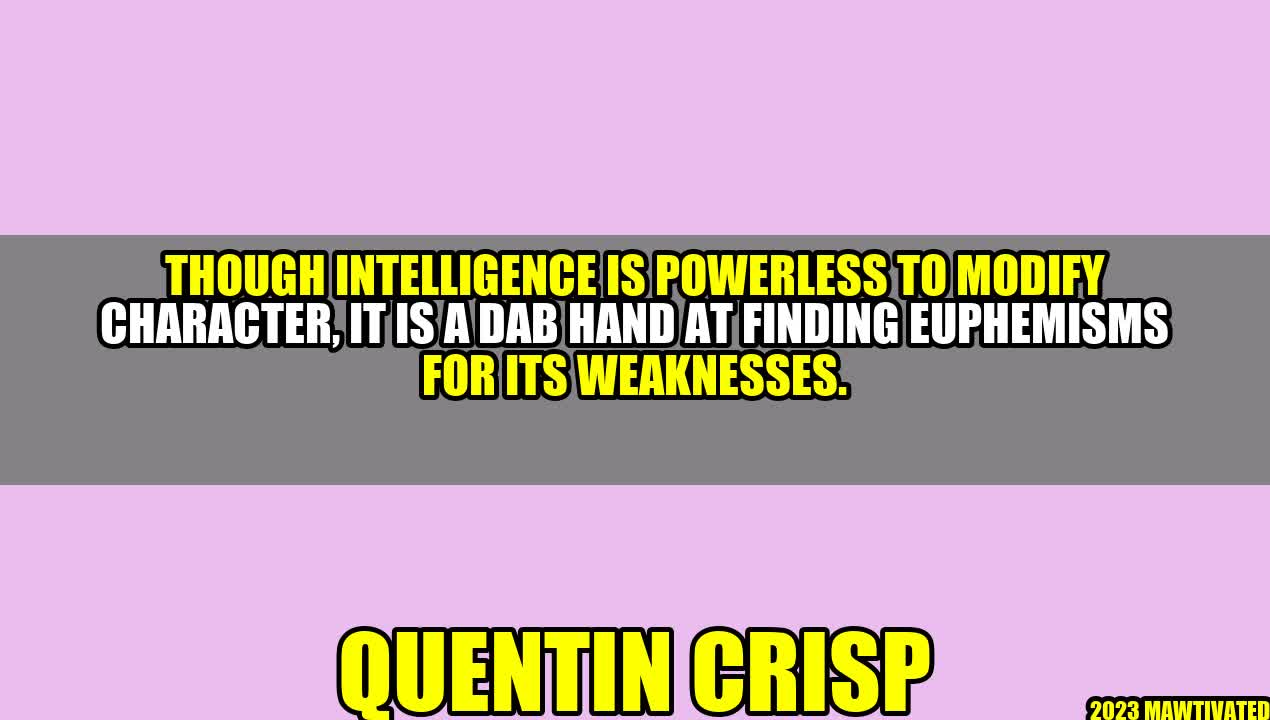Intelligence vs Character – Finding Euphemisms for Weaknesses

Henry Ford once said, “When everything seems to be going against you, remember that an airplane takes off against the wind, not with it.” It’s true that sometimes our weaknesses and flaws become a stumbling block in our path to success. But when we learn to acknowledge our weaknesses and work on them, they can become the driving force that propels us towards our goals.
However, it’s not always easy to accept our weaknesses. In fact, our intelligence often finds creative ways to disguise them. Instead of admitting that we lack certain qualities, we use euphemisms to portray ourselves in a better light.
“Though intelligence is powerless to modify character, it is a dab hand at finding euphemisms for its weaknesses.” – Quentin Crisp
Quentin Crisp, an English writer and raconteur, was known for his wit and tongue-in-cheek humor. He understood the human tendency to use euphemisms to avoid confronting unpleasant realities. But as he rightly pointed out, intelligence alone cannot alter our character flaws. We need to take concrete steps to change our mindset and behavior.
So, how exactly do we go about doing that?
1. Identify Your Weaknesses
The first step towards personal growth is to recognize your weaknesses. It’s not easy to admit that you are not perfect, but it’s a necessary step if you want to improve. Make a list of the areas where you think you could do better. It could be anything from procrastination, lack of assertiveness, or poor communication skills. Once you have identified your weaknesses, you can start working on them.
2. Seek Feedback
Constructive feedback is a valuable tool for personal growth. Don’t be afraid to ask for feedback from your colleagues, friends, or family members. They may be able to offer a different perspective or point out something that you didn’t realize about yourself. However, make sure to approach the right people who can give you honest and supportive feedback without being too harsh.
3. Take Action
Identifying your weaknesses and seeking feedback are only the first steps. To improve yourself, you need to take action. If you are struggling with a particular weakness, look for resources or tools that can help you overcome it. Attend workshops or classes, read self-help books, or seek the help of a coach or mentor. Remember, personal growth is a continuous process and it requires patience, perseverance, and commitment.
Conclusion
In conclusion, it’s important to remember that our intelligence can only take us so far. We need to recognize our weaknesses and work on them to become the best version of ourselves. Instead of using euphemisms to avoid confronting uncomfortable truths about ourselves, we should embrace our flaws and use them as a platform for personal growth. Follow these three steps to improve yourself: identify your weaknesses, seek feedback, and take action. With determination and hard work, you can become the best version of yourself and achieve your goals.
Hashtags: #personaldevelopment #selfimprovement #characterflaws #weaknesses #feedback #actions #growthmindset
SEO Keywords: personal growth, self-improvement, character flaws, weaknesses, feedback, actions, growth mindset
Article Category: Personal Development

Curated by Team Akash.Mittal.Blog
Share on Twitter
Share on LinkedIn